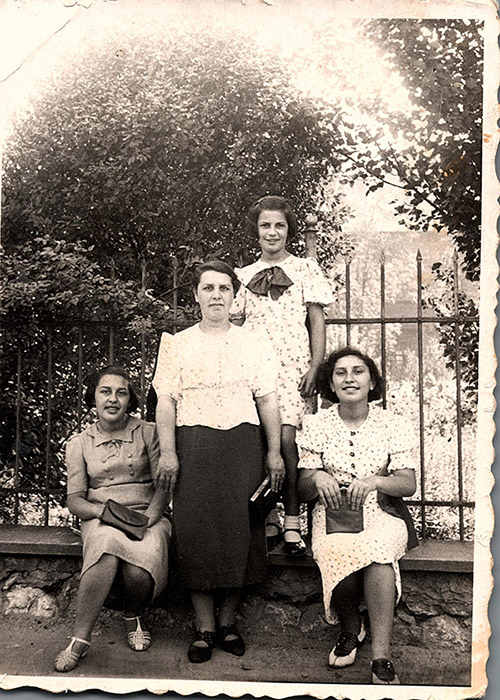Deported to the Plaszów concentration camp, Helen Jonas faced almost certain death. Instead, she was chosen by Amon Göth—the camp’s notorious, brutal commandant—to be his servant. Hear the story in Helen’s own words on the next episode of Those Who Were There: Voices from the Holocaust, a podcast co-production of the Museum and the Fortunoff Video Archive for Holocaust Testimonies.
Helen Jonas was born Helen Sternlicht in 1925 in Kraków, Poland. She was the youngest daughter of an observant Jewish family. The family was economically comfortable due to her father Szymon’s success as an ironworker. She had two older sisters and attended both Polish public school and Bais Ya’akov.

Kraków was occupied by Nazi Germany in the fall of 1939, and the bulk of the city’s 70,000 Jewish residents were expelled the following year. Helen’s family were allowed to stay because her father’s profession was judged “economically useful.” In March 1941, the remaining 16,000 Jews in Kraków were forced to move into a ghetto. Although they were subjected to food shortages and overcrowding, Helen recalls feeling hopeful that the ghetto might finally provide a respite from the violent harassment and persecution they had faced since the German invasion.
However, in May and June of 1942, Helen’s father was among 5,000 Jews deported from Kraków to the Belzec death camp. Further deportations followed in October, and the ghetto was finally liquidated in March 1943. Some ghetto residents were shot on the spot, others were deported to Auschwitz, and the rest – including Helen, her mother, and two sisters – were sent to a nearby labor camp called Plaszów.
Shortly after Helen arrived at Plaszów, the camp’s commandant, Amon Göth, ordered her to work in his quarters as a cleaning woman. For more than a year, Helen and another maid, Helen Hirsch, were in constant contact with one of the worst sadists of the Holocaust. Established in November 1942, Plaszów was an especially cruel labor camp where many executions took place. Witnesses estimate that Göth personally murdered at least 500 people during his time as commandant.
Helen was convinced that Göth would eventually murder her. But, miraculously, he did not. Göth frequently held parties, where Helen had to wait on the guests, including a German businessman named Oskar Schindler. In the early years of the war, Schindler was a callous capitalist who happily profited from the work of Jewish slave laborers at his enamelware factory. But then, for some reason, Schindler had a change of heart. He decided to use his fortune to save as many Jews from mass murder as he could. He ultimately saved the lives of about 1,200 people – including Helen and both her sisters.

Helen testified against Amon Göth at the 1946 trial that led to his execution. Two days after liberation, Helen met Joe Jonas, a fellow survivor, who she went on to marry. Jonas’s American uncle helped secure affidavits for Helen and her sisters. Helen and Joe arrived in 1947, settled on Long Island, and raised three children. Helen became the subject of numerous films and documentaries, including Steven Spielberg’s Schindler’s List (1993) and James Moll’s Inheritance (2006).

Although Helen passed away in 2018, her recorded testimony was preserved through the joint efforts of the Museum of Jewish Heritage and the Fortunoff Video Archive for Holocaust Testimonies. Listen to the interview on S2E4 of Those Who Were There: Voices from the Holocaust, available on Apple Podcasts, Spotify, and Stitcher.
Banner image: Helen and her future husband Joseph (Joe) Jonas, Austria, 1945. Courtesy of Vivian Jonas Delman.